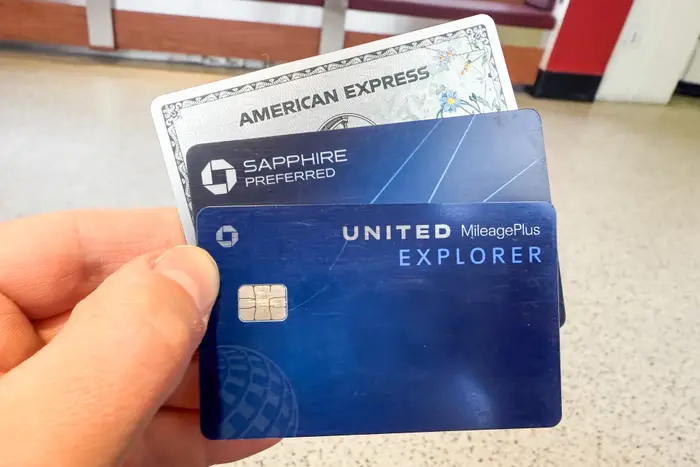As a dietitian, I know staying regular while traveling is challenging. I always pack these 5 things to avoid constipation.
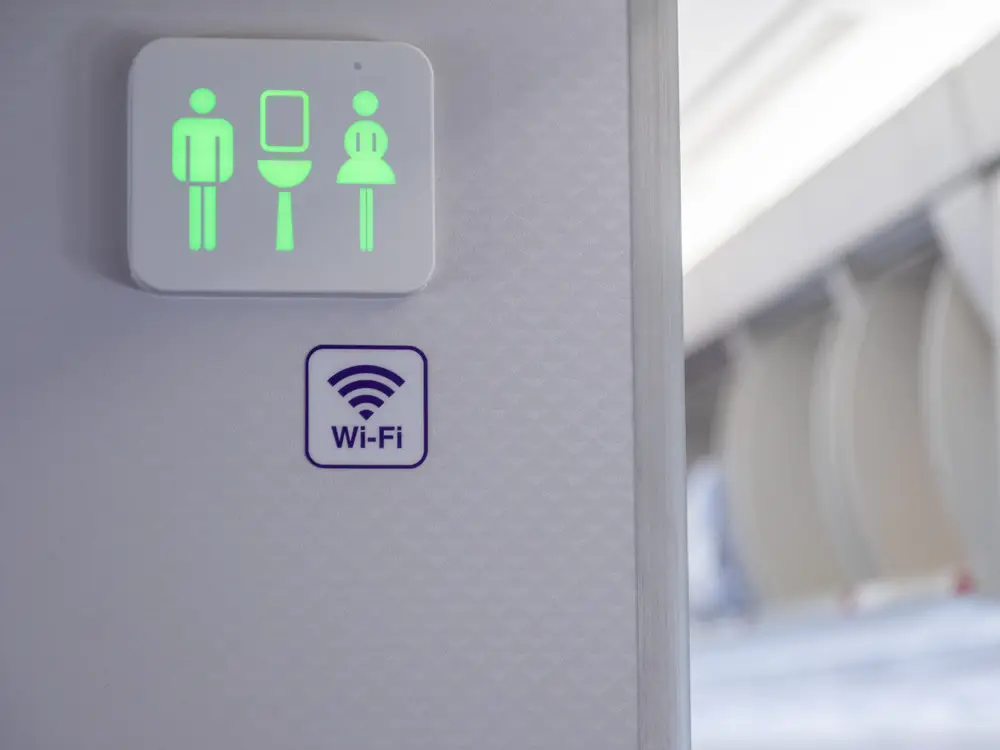
Maintaining regular bowel movements can be especially difficult on airplanes.
I recently traveled between the US and Greece, and I wasn’t going to let travel constipation ruin my dream vacation.
As a dietitian, I’ve learned that traveling can disrupt bowel-movement regularity for several reasons.
Changes in environment and routine can lead to stress, which can upset the digestive system. But when you travel, you’re also often eating new kinds of food that may have different effects on your body.
Being in a different time zone can also interfere with your normal eating and bathroom schedules.
These factors, alone or combined, can lead to travel constipation — a condition that’s uncomfortable, at best.
Instead of leaving it up to chance, I try to stay ahead of digestive issues by bringing a few simple things with me. Here’s what I packed when I went to Greece — and what it did for me.
Electrolyte packs helped me stay hydrated.
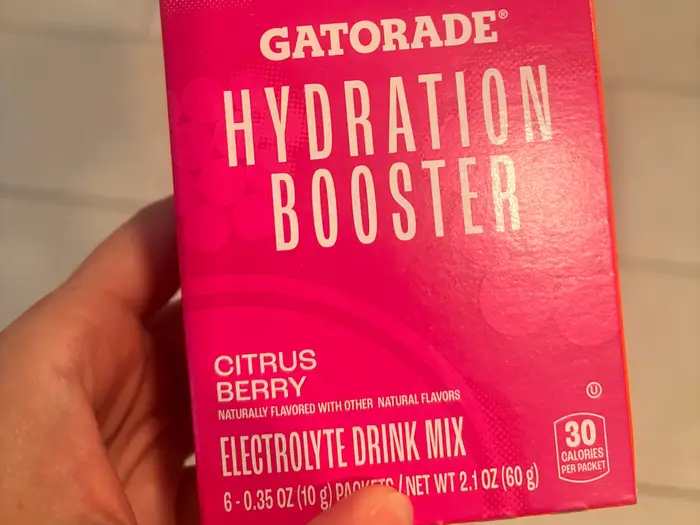
Drinking water with electrolytes can help prevent dehydration.
I don’t regularly lean on electrolyte packets at home. Some are full of sodium or other fillers that aren’t necessarily good for everyone (or necessary at all).
However, since long flights can often lead to dehydration due to the dry air in the cabin and limited access to fluids, I make an exception while traveling. Adequate water levels are needed to perform various critical functions, including digestion.
Plus, when you’re dehydrated, the body tries to conserve water by absorbing food waste in the intestines and colon. This absorption can lead to harder, drier stools that can be difficult to pass, causing constipation.
Sprinkling a pack of electrolyte powder into my water bottle is an easy way to get ahead of dehydration on long flights.
Prebiotic fiber was easy to add to things like yogurt.

There are a lot of prebiotic fiber supplements on the market.
Fiber, in general, helps keep things moving in the gut — as an indigestible complex carbohydrate, it has to go somewhere.
Prebiotic fiber is unique because it fuels the good bacteria in our digestive tract, which can help support gut health.
When I’m traveling, I like to add 2 teaspoons of powdered prebiotic fiber (I use the brand 38Tera) to my morning yogurt to get things moving early in the day.
As with any supplement, you should speak with your doctor before trying it to make sure it’s right for you.
I ate prunes every day of my trip.
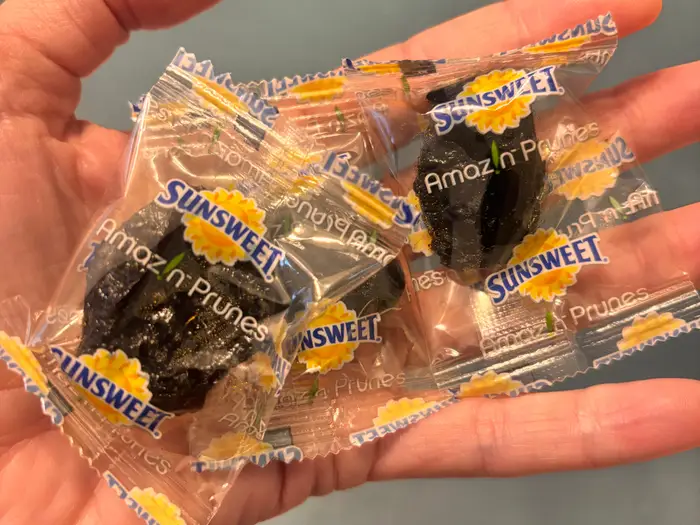
I like to buy individually wrapped prunes.
Prunes help support digestive health with 3 grams of fiber per serving. Plus, they don’t require refrigeration and can be bought in convenient individually wrapped packs.
All of that makes the dried fruit ideal for travel, as I often have a hard time meeting my fiber goals while I’m on a vacation diet.
I like to pop a few prunes in my purse and eat one every day of my trip to keep things consistent.
All the snacks I brought also supported regularity.
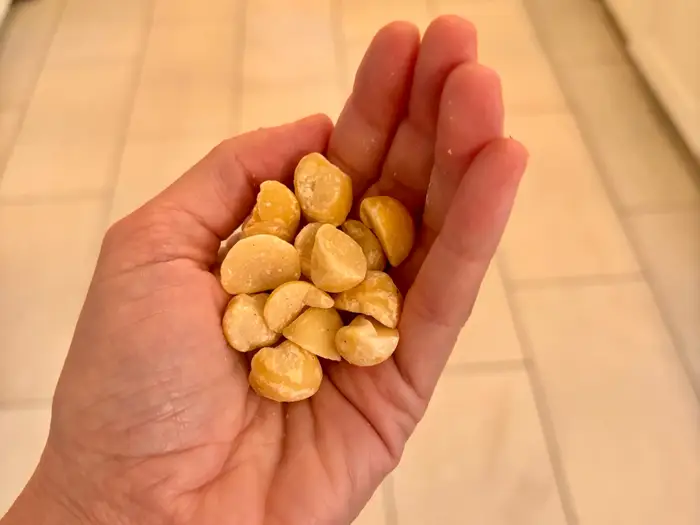
Macadamia nuts have fiber, vitamin B1, and healthy fats.
It can be tempting to reach for pretzels or potato chips on travel days, but I know maximizing fiber intake through snacks will lead to a better outcome.
Nuts and seeds are portable, nutrient-dense sources of fiber that are easy to nosh on while traveling.
When possible, I like to opt for nuts that also provide vitamin B1 (thiamine) since it’s been linked to reducing constipation. Macadamia nuts are my go-to, and I also like that they’re a source of good fats like omega-9 fatty acids.
I try to help manage my stress with tulsi-ashwagandha tea.
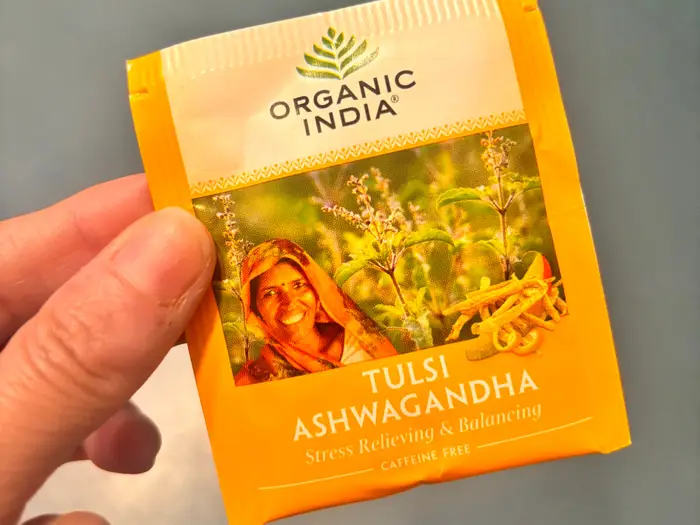
Talk with your doctor before incorporating ashwagandha tea into your diet.
The nervous system can alter the regular functioning of the gastrointestinal tract. For example, stress hormones can disrupt normal muscle contractions in the intestines, affecting the movement of food and waste through the body.
I like to go out of my way to manage my stress while traveling to support my digestive system. One thing that has helped me is sipping on tulsi-ashwagandha tea.
Ashwagandha, an adaptogenic herb traditionally used in Indian Ayurvedic medicine, has properties that research suggests may help the body manage stress and improve energy levels. As a bonus, studies have indicated that tulsi (known as holy basil) can support the immune system, which can also be compromised while traveling.
This isn’t as clear-cut as some of the other tips because everyone reacts to stress differently. Additionally, holistic medicine often isn’t regulated, so again, you should always consult your doctor.
But finding any way to keep your stress in check on a trip can do a lot of good for your gut.

